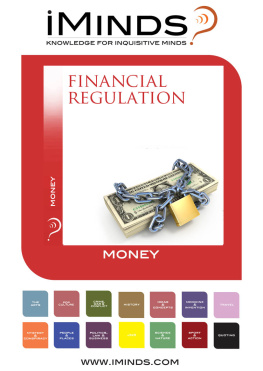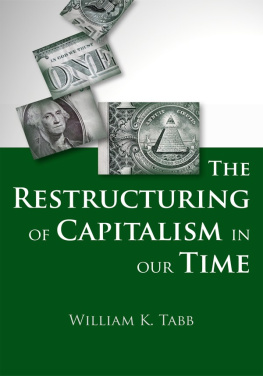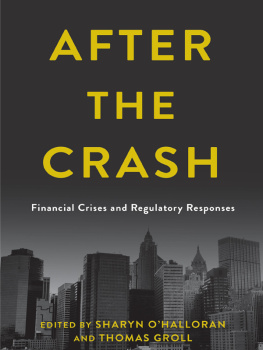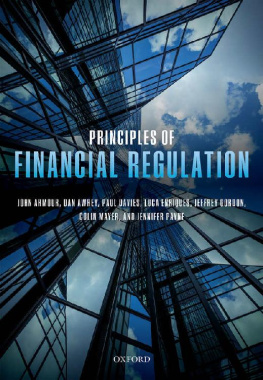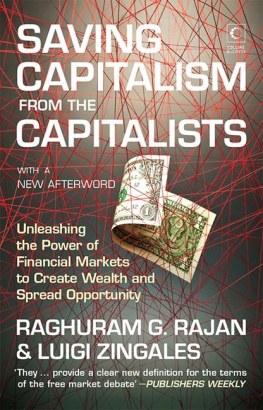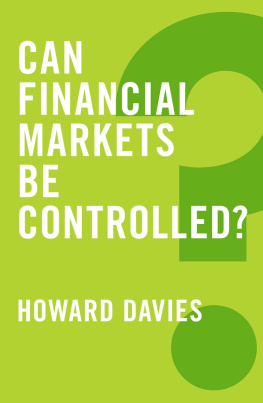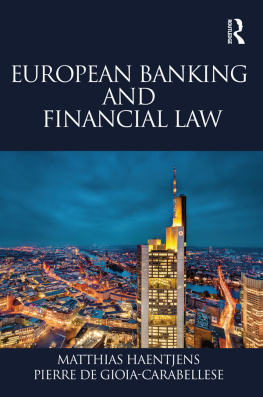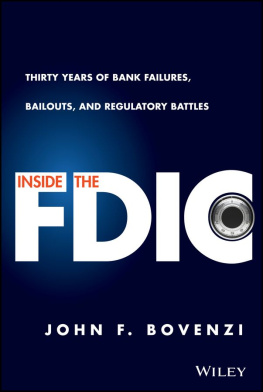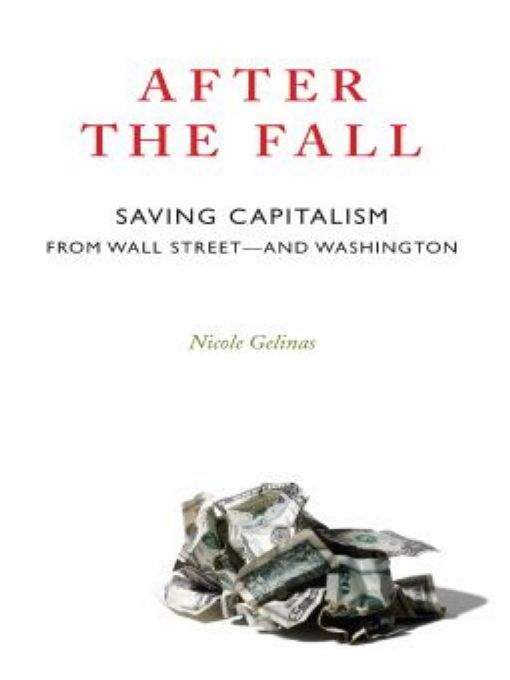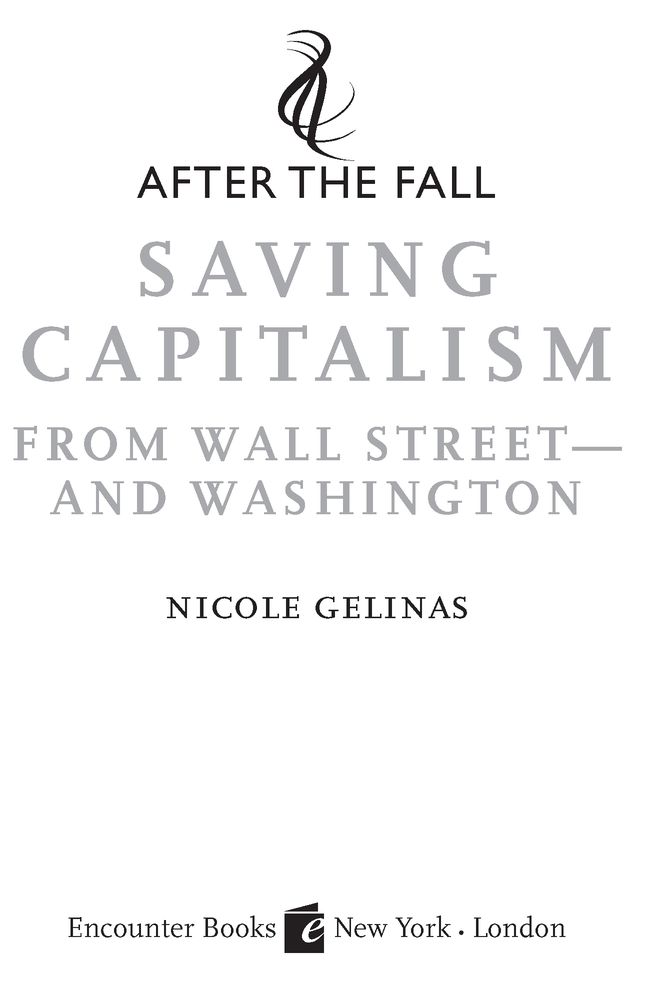Table of Contents
For my husband
PREFACE
The only reasons I can think of why firms might underinvest to control risk are due to failures in government: Firms may believe that government will not let them fail under a Too Big to Fail Policy... or that the bankruptcy code may not impose sufficient penalties for failing.
Wendy Gramm, former Commodity Futures Trading Commission chairman, September 1993
The authority to decide how to resolve a failing [financial] firm under the special resolution regime should... be vested in Treasur y.... The regime... should provide for the ability to stabilize a failing institution... by providing loans to the firm, purchasing assets from the firm, guaranteeing the liabilities of the firm, or making equity investments in the firm.
United States Department of the Treasur y, June 2009
THE CREDIT CRISIS AND THE RESULTING RECESSION are the work of an invisible handnot the invisible hand of free markets but of an overwhelming government interference in those markets. Over a quarter of a century, Washington gave the world of finance a terrible privilege: freedom from the fear of failure.
Until the early 1980s, banks, securities firms, and insurers, like all other companies, operated under market discipline. Federal laws prescribed a consistent, predictable way in which financial firms could fail, with investors, including lenders, taking their warranted losses.
Starting in the early eighties, though, the financial industry began to escape these orderly mechanisms. Many banks and securities firms eventually became too big to fail. They thus gained an invaluable advantage as they competed with other companies and industries for resources: their lenders knew that they did not have to worry about losing their investments. As a result, these market participants no longer transmitted vital signals about the prospects for success or failure.
Financial firms, implicitly subsidized by the government, replaced measured risk-taking with recklessness. Bankers and traders, insulated from the full market consequences of their decisions, created instruments that circumvented reasonable government limits on borrowing and exposure. These innovations further sidestepped requirements for disclosure of information.
Under four successive presidents, from Ronald Reagan to George W. Bush, Washingtons response to concerns that regulation had become inadequate to deal with modern finance was to say that the markets could regulate themselves better than the government could.
Paradoxically, though, even as Washington placed such great reliance on self-regulating markets, government policies shortcircuited the ability of the markets to do their work. Washingtons too-big-to-fail policy increasingly hampered the markets from forcing financial companies to rein in excess. The complex instruments they created gradually heightened the risk to the economy posed by the failure of even a small financial firm.
Government subsidy of financial failure kept the free market from doing its work in other ways, too. Financial firms lent profligately to American consumers. In their unique ability to offer executives and employees multimillion-dollar bonuses, financial companies made it difficult for companies in other industries, like engineering and technology, to compete for talent.
Starting in 2007, the free market had had enough. Fleeing investors and plummeting asset prices exposed the modern financial industrys untenable risks. By 2008, Washington had no choice but to step in and take over virtually all activity within the industry in an effort to keep the economy from spiraling into depression.
Without changes in how Washington approaches Wall Street, the financial industry will continue to operate without the benefit of clear market signals. The inevitable result would be even more economic distortion, because finance is responsible for one of the most important roles in the economy: determining which people and which businesses should have access to investment capital and on what terms.
Robust financial markets do not imperil capitalism but support it. To ensure that financial markets can do their job, lawmakers and regulators must re-create an orderly, consistent way for lenders to failed financial institutions to take losses, reintroducing market discipline. So that the economy can better withstand inevitable financial-company failures, lawmakers and regulators must reasonably regulate financial markets and instruments, using well-tested principles that, as the following pages show, have worked in the past and would work again.
INTRODUCTION
The verdict of the jury in the Insull case came as a surprise to most people.This may be because they had not heard the testimony at the trial, as the jury had.... [Insull] had built up an enormous structure of interlocking securities, which fell with a great crash and ruined thousands of investors.The question was, however, whether in the process anything criminal had been done, and the jury decided that there had not been.
editorial, New York Times, November 26, 1934
This was about the real costs for normal people who suffered because of the machinations in the executive suites at Enron.... Many long-standing employees... lost huge chunks of their retirement funds and still face an uncertain old age. We hope the jurys verdict deters other corporate kingpins from breaking the rules.
editorial, New York Times, May 26, 2006
ON JUNE 14, 1935, THE DISGRACED TITAN SAMUEL Insull left court a free but broken man. The former utility executive had won acquittal at three separate fraud trials stemming from the collapse of his Chicago-based electricity giant in 1932, a collapse precipitated by complex, unregulated financial engineering. He is without money and faces life anew, perhaps to take a job, the New York Times observed. He would die three years later in near-poverty in a foreign city.
Insulls acquittals, seen in one light, were bitter failures for the government and the American public. President Franklin Roosevelt himself had identified Insull as a public face of the Great Depression even before taking office, calling him a reckless promoter whose hand is against every mans in September 1932. Yet the government had compiled and presented thousands of pages of evidence and hours of witness testimony to no avail.
Seventy-one years later, in another case of a fallen energy company, Enron, the government would fare better. On May 25, 2006, two of the firms former executives also left court broken mennot free to skulk away in ignominy, as Insull had been, but convicted of twenty-five counts of fraud and other crimes. Former Enron CEO Kenneth Lay, the marquee defendant, died weeks later. Jeffrey Skilling, also a former CEO, was soon sentenced to more than twenty-four years. It seemed that the government had succeeded in dispatching the two men who represented another era of corporate misdeeds and, just as important, protected the public by preventing similar wrongdoing in the future. The jury has spoken and they have sent an unmistakable message to board-rooms across the country that... no matter how rich and powerful you are, you have to play by the rules, a prosecutor said.


